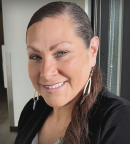My maternal grandmother, mother, and two of my mother’s sisters were all diagnosed with breast cancer when they were relatively young, so I figured one day, the disease would come for me. Breast cancer is the most common cancer diagnosed among Alaska Native women,1 and at a very early age, my sister and I learned we would have to be vigilant to stay ahead of the disease. We were both diligent about getting our routine annual mammogram screenings and performing breast self-exams. We were also tested for the BRCA1/2 variant and were relieved to learn we are not carriers. Still, we used to joke that one day, cancer was going to get us.

Dawn Yates
I thought when that day came that I’d be prepared to hear the words “You have breast cancer,” but nothing actually prepares you for those words. When I got a diagnosis of stage I estrogen receptor–positive, progesterone receptor–positive, HER2-negative breast cancer, in 2019, I was completely devastated. All I could think about was how much I wanted to stay alive for my three children. I consoled myself with the belief that I would be okay, and that although it might be uncomfortable for a while as I underwent treatment, I was not going to die.
Facing Difficult Choices
In the fall of 2019, I had noticed dimpling around my left breast, which happened to coincide with the date of my regularly scheduled mammogram. The test detected a small mass in my left breast, and a tissue biopsy later confirmed the breast cancer diagnosis.
When I met with my surgical oncologist, he gave me three treatment options: lumpectomy, mastectomy, or bilateral prophylactic mastectomy. I spent the next 2 weeks researching my type of breast cancer and treatment options and decided to proceed with a bilateral prophylactic mastectomy, followed by immediate breast reconstruction.
I made that decision because I didn’t want to spend the rest of my life waiting for the other shoe to drop. I wanted to reduce my risk of a recurrence as much as possible and put cancer behind me. However, the process has been more complicated than I anticipated.
“Since my cancer diagnosis and treatment, I feel like I’ve aged 30 years, but I’m cancer-free and very grateful for the life I have.”— DAWN YATES
Tweet this quote
During a pathologic examination of the tissue from my left breast, a second malignancy was discovered, which had not been visible on the mammogram. If I had had a lumpectomy to remove the area with one of the tumors, it is likely the second mass would have been detected at a much later stage, possibly after the cancer had spread to other organs, ending all chances for a cure.
However, the discovery of that second malignancy meant I would have to undergo months of a very difficult chemotherapy regimen consisting of dose-dense doxorubicin, dose-dense cyclophosphamide, and paclitaxel, plus 5 years of tamoxifen hormone therapy. The side effects from treatment have been very challenging. I gained 40 pounds while undergoing chemotherapy, some of which I’m still trying to shake off, and the hormone therapy is causing such achiness in my joints that I need weekly acupuncture treatments to get relief.
Living in the Present
Since my cancer diagnosis and treatment, I feel like I’ve aged 30 years, but I’m cancer-free and very grateful for the life I have. Working at the Alaska Native Medical Center in Anchorage, which serves nearly 160,000 Alaska Natives and other Native Americans, I see the effects of cancer and other life-threatening diseases on this community. I’m thankful I can contribute to improving health care for this patient population.
Before my cancer diagnosis, I thought I was invincible and had the gift of time. I was sure I was going to see age 85. I no longer believe I’ll live into old age, so I try to live every day to the fullest. I don’t dwell on situations I can’t control or regret luxuries I don’t possess. I just appreciate what I do have, especially the love of my family, and the joy of living in the present.
REFERENCE
1. Nash SH, Zimpelman G, Stillwater B, et al: Invasive breast cancer among Alaska Native women in Alaska. Int J Circumpolar Health 78:1633190, 2019.
Ms. Yates, who lives in Hydaburg, Alaska, is Program Manager in the Oncology, Infusion, and Rheumatology Clinics at the Alaska Native Medical Center in Anchorage.
Editor’s Note: Columns in the Patient’s Corner are based solely on information The ASCO Post received from patients and should be considered anecdotal.

